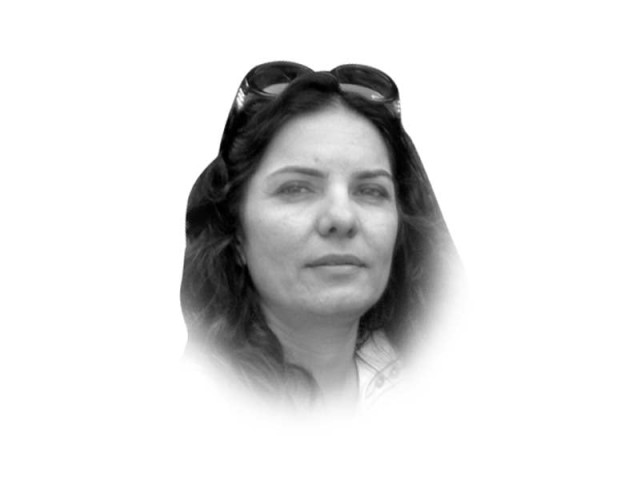The imaginations of Pakistani patriots
Haqqani's lesser-quoted essay “Inhospitable Homeland” reads almost as a prescient comment about the memogate affair.

Normally, for the moralising journalists, our national pride depends exclusively on rejecting American interference. But in the case of Ijaz, they are willing to consider him as an exceptional American. They afford him the legitimacy he so obviously craves. Mr Haqqani’s own narcissism notwithstanding, the diasporic with verbal diarrhoea (that, too, in an American accent) is perhaps the most unattractive species of them all.
The imaginative possibilities behind memogate are so instructive that it’s a pity to reduce it to politics. Most people are familiar with Husain Haqqani’s political narratives but there is a lesser-quoted essay, in which he writes about the relationship of fiction and realism and which reads almost as a prescient comment about the whole memogate affair.
It’s an essay titled, “Inhospitable Homeland” which is part of a collection of commentaries on Salman Rushdie’s writings (Midnight’s Diaspora, Viking Penguin (of course!), 2008). Already this will have confirmed to some philistines that, in itself, this is proof of Haqqani’s proneness to treachery. Those more sophisticated, would be interested to see that in Daniel Herwitz’s introduction to the collection, Haqqani’s credentials include his record as, “advisor to three prime ministers” — ouch! In the current context, this could be read as incriminatory but one can bet Haqqani reads it as a compliment. Political versatility aside, Haqqani is an artful litterateur. In “Inhospitable Homeland”, he first quotes the disdain, and sometimes ridicule, that Rushdie subjects Pakistan to in his novels and interviews.
Haqqani then attempts to address the ‘intensity of Rushdie’s views’ on Pakistan. He draws parallels between the subcontinent’s division in 1947 and Rushdie’s realised preference to be on the Indian side of the divided legacy and inheritance.
Haqqani goes on to explain how Pakistan’s fear of dilution of its Muslim identity led it to, what Rushdie describes as, the “insufficiently imagined” country that it became. Haqqani argues that the reinforcement of the ideology of Islam as defined by General Ziaul Haq, aligned it closer with the opportunist theocrats of the day rather than with Pakistan’s founders.
Haqqani also traces the campaign led by Maulana Kausar Niazi in 1989 against Rushdie’s Satanic Verses with the collusion of the ISI. He suggests this was an effort to embarrass and pave the way for a coup against the civilian elected government of Benazir Bhutto, even though her government had already banned the book. But before this becomes another literary confirmation of Haqqani’s views on the intelligence agency, what is more instructive is his description of the role of religious parties in the domestic violence that was unleashed in the wake of this campaign.
It seems Pakistan’s patriots are always keen to express nationalism through violent demonstrations, by lynching detractors, assassinating ideas and exposing self-defined immorality. But they refuse to actually read, write or advocate a viable, non-military, peaceful defence for our homeland. This notion of defending the nation by political means, leads Haqqani to make a rather Shellyian plea for understanding Pakistan’s identity crisis by comparing it to the “psychosis of the unwanted child”, or a victim of a custody battle in the aftermath of a divorce. But he does argue, at the end of his essay, of the possibility of a reimagined Pakistan as “inclusive, pluralist, democratic and modern”.
Rushdie may have overstated the idea of Pakistan being ‘insufficiently imagined’ but one thing is for sure, the memo was certainly the work of an insufficient imagination. For the sake of aesthetics alone, one hopes it was not the work of an essayist but the crude result of what may be expected of the successful, yet frustrated, diasporics who believe that wealth can buy political fame or long distance patriotism.
The anti-intellectual prose of Ijaz may be surmised in his interview with Fareed Zakaria: “Now I’m not a writer of a book like Ahmed Rashid, I’m not a decorated veteran of some war, I’m not a former secretary of state, I’m not you. You’ve got a great credibility to do these things just on your name alone. In my case, because I’m a businessman who theoretically has nothing to do with these kinds of issues, what I wrote in Financial Times and how I wrote it needed to have a certain authenticity to it”.
Maybe in the US, contribution to campaign funds can buy social and media relevance and even authenticity. In Pakistan, one hopes the media can play a wiser social role and not overplay the relevance of those who have no political capital in Pakistan. This has to be matched by the government’s willingness to prove that the former ambassador himself did not play the role of an overreaching and adventurist patriot either. The possibility of a reimagined Pakistan seems to lie in the balance between overworked and insufficient imaginations.
Published in The Express Tribune, December 12th, 2011.













COMMENTS
Comments are moderated and generally will be posted if they are on-topic and not abusive.
For more information, please see our Comments FAQ